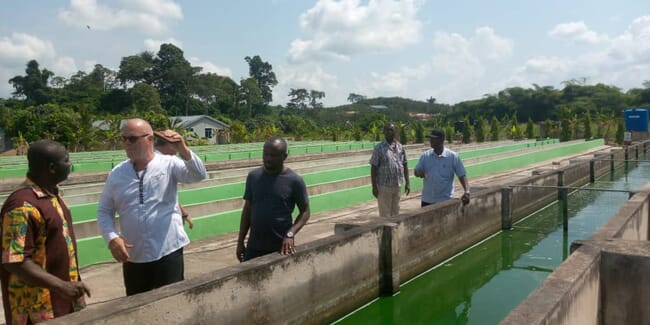
© Efua Konyin Okai
Ghana’s tilapia farmers face severe challenges after a decade of tremendous growth in production. Just as they began bouncing back from high fish mortality caused by the infectious spleen and kidney necrosis virus in Lake Volta, Covid-19 and its related lockdowns and restrictions now are slowing down the activities of the sector, making training all the more important.
“The 2019 baseline study conducted by the International Food Policy Research Institute (IFPRI) and CSIR-Water Research Institute (CSIR-WRI) exposes farmers’ vulnerabilities. Poor sanitation and biosafety measures and poor aquaculture management practices seem to be causing low productivity and low profitability, discouraging some farmers from continuing in the sector. The TiSeed project partners are working to provide technical support to those farmers who are not doing well,” said Dr Catherine Ragasa, IFPRI senior research fellow and TiSeed project leader.
Through the TiSeed project, in July and August 2020, 182 farmers,15 commercial hatchery operators, and 30 zonal officers in Ghana’s six major aquaculture producing regions (Eastern, Volta, Ashanti, Bono, Bono East, and Ahafo) received training on good aquaculture practices. Each two-day session consisted of presentations on key topics by CSIR-WRI, IFPRI, and FC experts and field visits to nearby “model” farms. Farmers were grouped into training clusters, with 20–30 farmers trained in each cluster and 10 clusters conducted in the six regions.
“The challenges the aquaculture sector faces are a reminder of the crucial importance of biosecurity and sustainability measures,” says Dr Peter Ziddah, a fish health expert at the Fisheries Commission (FC). Facilitators also took turns to address farmer challenges including pond and cage preparation before stocking, feeds and feeding, water quality management as well as harvest and marketing strategies.
“Post-training assessment questionnaires from farmers and hatchery operators show that the training sessions were rated very favorably. Almost all participants rated the sessions 8,9 or 10 on a scale of 1–10, with 10 being excellent,” said Mathew Oyih, director of aquaculture at FC.
“I was on the verge of stopping fish farming, but this training has urged me to go into it again,” said a farmer in Sunyani. “This training should be periodically conducted to help us have fresh ideas,” said a farmer in Dormaa.
Fifteen young graduates (6 females and 9 males) under the Nation Builders Corps (NABCO) and National Service Personnel also benefited from the training. These young graduates are being prepped to support in the FC’s aquaculture extension services. “I am a graduate of hospitality management, but have developed great interest in fish farming and will like to start my own fish farm together with a restaurant.” said a female NABCO graduate. Another female NABCO graduate also indicated the training has exposed her to the importance of record keeping and how to assist farmers to take good records on the right parameters. She said she can now better assist farmers in this regard during extension visits.
“The training manuals and extension materials used in the training sessions were carefully crafted by 15 experts with diverse background and experience in aquaculture production including those in the Marine and Fisheries Sciences Department at the University of Ghana, FC, private hatchery operators, farmers, retired aquaculture experts, CSIR-WRI and IFPRI, with guidance and materials from WorldFish and United Nations Food and Agriculture Organization,” reports Dr Ruby Asmah, principal research scientist, CSIR-WRI.
One of the main objectives of the TiSeed project is to improve the adoption of good aquaculture practices, including the use of high-quality fingerlings. In order to rigorously measure the impact of the farmers’ training over time, these training sessions were conducted in 30 preselected districts (with 30 comparable districts remaining as a control group) in the six major aquaculture regions.
“The TiSeed Project will continue to test and evaluate farmers’ training and technical assistance, along with a specific focus on encouraging and training more women and youth to go into fish farming,” reports Dr Seth Koranteng Agyakwah, research scientist, fishery and aquaculture division at the Aquaculture Research and Development Centre (ARDEC) of CSIR-WRI, and lead of the local consortium partners in Ghana. “We are also piloting a mobile application to assist farmers in their record keeping and business management. In addition, we are helping set-up the certification protocols and processes for hatcheries and establish fingerling nurseries, especially in remote areas, to improve access to high-quality fingerlings and reduce fish mortalities associated with transportation.”


